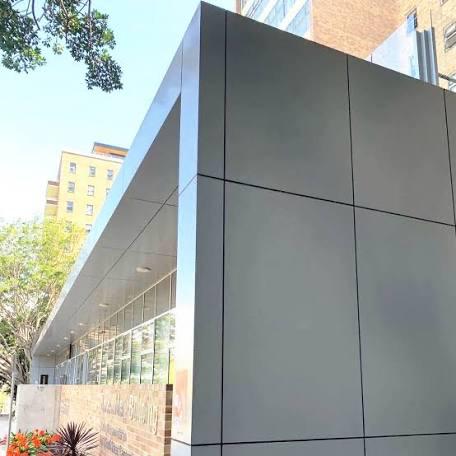 Aluminum composite panels (ACPs) are comprised of a three-layer composite material. Composite materials are materials made of two or more materials with different physical or chemical properties. The three layers that make up ACPs are two thin aluminum sheets sandwiched between a non-aluminum core.
Aluminum composite panels (ACPs) are comprised of a three-layer composite material. Composite materials are materials made of two or more materials with different physical or chemical properties. The three layers that make up ACPs are two thin aluminum sheets sandwiched between a non-aluminum core.
There are two main types of ACPs cores: The first is low-density polyethylene (LDPE) or polyurethane, which is the popular core material used in ACPs due to its lightweight and affordability. The second is fire rated ACPs. Fire-rated ACPs are made up of formulated fire-resistant material, which makes it more expensive but it can withstand extreme temperatures.
Why Are ACPs Used for Wall Cladding?
Aluminum composite panels are commonly used as a cladding material because of their advantages such as high durability, lightweight, and sleek appearance. Many designers prefer ACPs to traditional cladding materials because they enhance the overall look of the building and are very easy to maintain
Benefits of ACPs for Wall Cladding
- Durability: Wondering why architects prefer ACP cladding to other types of cladding? It is simple. Wouldn’t you also prefer a weather-resistant material to one prone to rust or photodegradation? Aluminum composite panels maintain their shape, size, and strength even in harsh weather conditions. So, with ACPs, rest assured your cladding will retain its structural strength for years.
- Lightweight: Many people find it surprising that despite the strength of ACPs, they are actually lightweight. ACPs are made up of two thin aluminum sheets bonded to a core material such as polyethylene. Aluminum is a low-density material weighing about a third of steel, making it a light material that helps reduce the load on the building structure.
- Easy to Install: Since ACPs are made of a lightweight material, installing them is easy. It requires little effort to bend or cut ACPs to any size or shape to create designs that could otherwise be impossible with other cladding materials.
- Low Maintenance: Aluminum composite panels do not require much maintenance. To clean ACPs, you only require a simple wipe with a soft cloth, and that is all.
- Customizable: ACPs are available in different colours, textures, and finishes. Apart from that, you can also customize the length of the panels to suit specific customer requirements.
- Fire-Resistant: As explained at the beginning of this article, ACPs can be made with a fire-rated aluminum core. Fire-rated ACPs are safer to use as they can resist fire for up to two hours.
- Cost-Effective: If you are on a budget, aluminum composite panels are your go-to material for wall cladding. They are one of the cheapest cladding materials in the market, offering all the above benefits.
- Eco-Friendly: The process of manufacturing ACPs is energy efficient, and aside from that, ACPs reflect less heat to the environment. ACPs are also 100% recyclable, which contributes to the reduction of greenhouse gas emissions.
Using ACPs in Toronto’s Climate
It is no news that weather conditions can greatly impact the durability of building materials. For a place like Toronto, where heavy rain and extreme snowfall are common, architects and homeowners must use strong and resilient building materials for building construction.
Heavy downpours are common in Toronto and can cause significant structural damage, especially if building materials are not properly sealed or maintained. Snowfall is another challenge to buildings in Toronto. Accumulated snow can introduce moisture into wall cladding materials, which can expand and cause cracking or other damage to the cladding.
Canada is warming twice as fast as the rest of the world, necessitating the rewriting of Canada’s building rules. Architects and homeowners are advised to use weather-resistant, durable, and resilient materials such as ACPs to protect residents from extreme weather.
Maintenance Practices for ACPs
If your building is in Toronto where rainfall is common, you have less cleaning to do. The rainfall will do most of your cleaning for you. Most, not all. You still have to clean because rain can only wash off dirt. You need to clean by yourself to remove grease and fingerprint stains on the ACPs.
One mistake you should not make when cleaning your ACPs is cleaning during an extremely hot or cold temperature. Direct sunlight can cause the water and detergent to dry out too quickly, leaving soap or dirt marks on the surface. In the same vein, cleaning ACPs in freezing temperatures can cause the diluted mild soap solution to freeze on the surface of the ACPs.
Avoid using abrasive substances or acid, bleach, and paint-based detergents to clean ACPs. Instead, always use a mild alkaline solution when cleaning ACPs.
Choose Canada Plastics & Belting Inc. for Aluminum Composite Panels in Toronto
If you are looking for a cost-effective material that can withstand the elements and provide a long-lasting finish for your walls in Toronto, then ACPs are a good option to consider. Canada Plastics & Belting Inc. is proud to offer a wide selection of aluminum composite panels in multiple colours, sizes, and thickness options. Contact us today for all your aluminum composite panel needs or call us at 416-291-3036 for a free quote.
